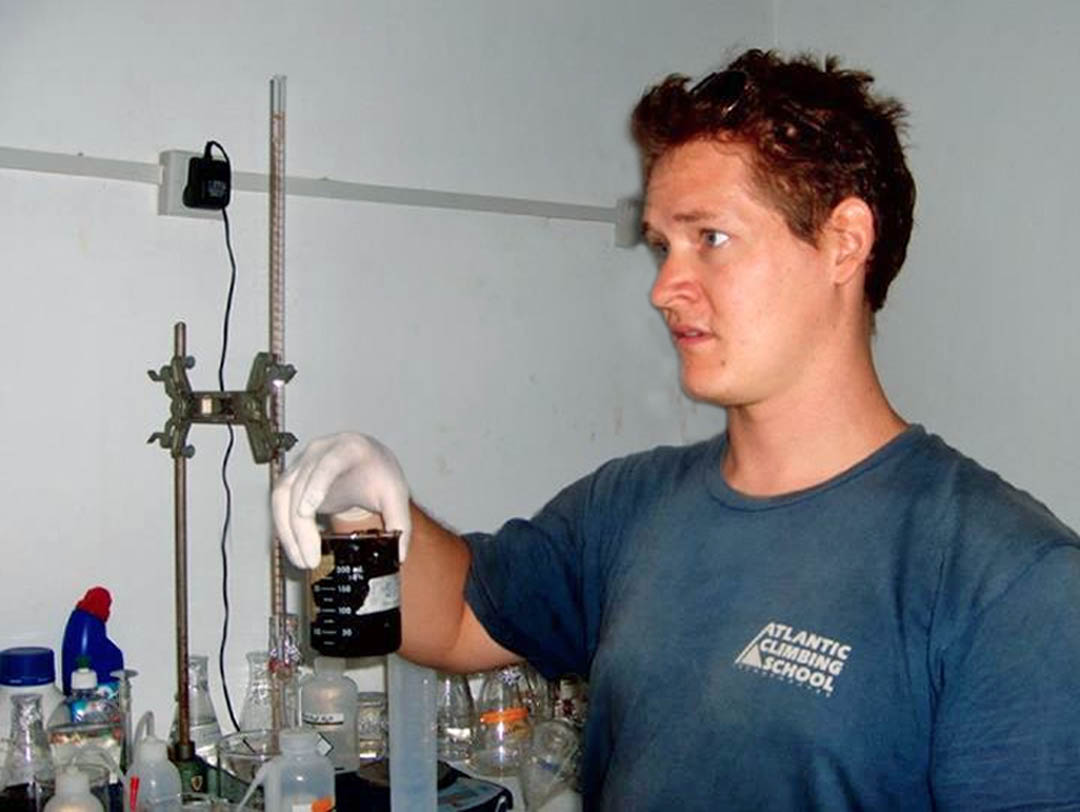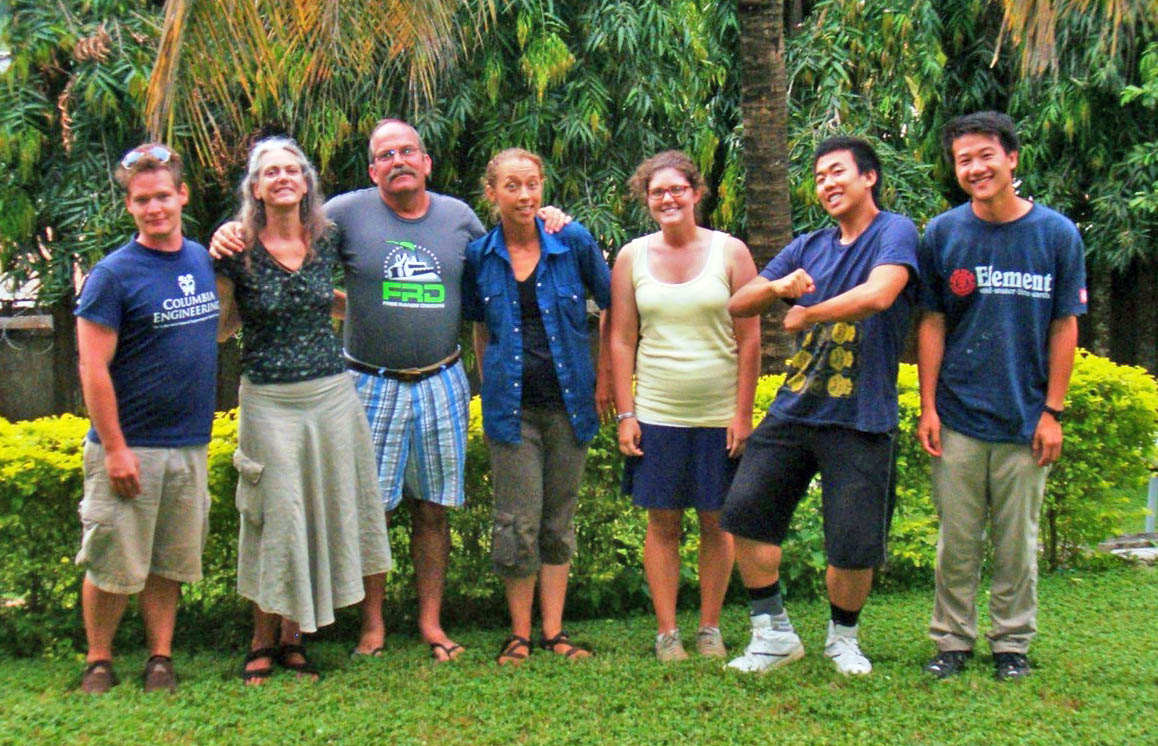
College News
CCCC graduate researches fecal sludge to fuel in Ghana
04.18.2013 • College & Community, Students/Graduates
PITTSBORO - A day in the life of Central Carolina Community College graduate Jeremy Rushlow begins at 5:30 a.m. when he grabs two bananas and walks down to his vegetable garden in Kumasi, Ghana.
On the way, he greets his goats Apanchie and Go At and inspects his chickens for eggs that will go into a morning omelet. After breakfast, he makes a lunch of leftovers and travels via tro-tro (van) either to the lab or to the dump site in Kumasi where his team of engineers is constructing a pilot facility that will convert fecal sludge into biodiesel fuel.
Funded by a $1.5 million grant from the Bill and Melinda Gates Foundation, the project is known as "The Next Generation Sanitation Facility." Its purpose is to address the problems of waste disposal and produce a cost-effective sustainable energy source for developing countries like Ghana.
Dr. Kartik Chandran, associate professor of Earth and Environmental Engineering at Columbia University, heads up the research. Rushlow is part of a team of engineers testing the various scientific techniques of converting the sludge into biodiesel fuel. The project represents a collaboration among Columbia University's Engineering School, Waste Enterprises, Ltd., the Kwame Nkrumah University of Science and Technology, and the Kumasi Metropolitan Assembly.
If the project is successful, it would not only make sewage treatment economical for the developing world, but also vastly improve energy security and water conditions around the world, according to an article that appeared in a 2013 edition of the "BioFuels Digest" online newsletter.
"A majority of the world does not have proper sanitation and that is mainly due to the fact that processing waste streams is a cost-sink rather than a cash crop," said Rushlow. "By converting this waste into biodiesel, we are attempting to revolutionize sanitation."
After receiving an Associate in Applied Science degree in Alternative Energy Technology: Biofuels from CCCC, Rushlow worked as a production manager for Piedmont Biofuels. He was interviewed for the Ghanaian project via Skype by Columbia University and Waste Enterprises CFO Tim Wade. He won the job through his hands-on experience at CCCC and as a production manager at Piedmont Biofuels, but his interest in alternative energy sources began many years before.
"I became interested in biofuels when a friend of mine mentioned biodiesel fuel as a possible business opportunity," he said. "After about two months of experimenting, I was hooked."
The partners' developed their first batch of biodiesel in a home blender. They eventually used old hot water tanks to process the fuel. But the real byproduct of this business venture was Rushlow's desire to build a career in alternative fuels and sustainability.
Biofuels are organic and can be made from a wide variety of sources including corn, sugar cane, animal fat, sunflower seeds, wild grasses and soybeans. They eliminate carbon-based emissions produced by fossil fuels, such as oil. Unlike fossil fuels, they are renewable, biodegradable and very cost effective, Rushlow said.
When he saw a magazine ad for CCCC's Associate in Applied Sciences in Alternative Energy: Biofuels program, Rushlow's future was sealed. He made the decision to move to North Carolina and enroll in the Biofuels program at the Chatham County Campus. He graduated in 2010 and was one of the first students nominated to receive the North Carolina Community College System's Dallas Herring Award for outstanding achievement.
"CCCC is the reason I am where I am today," he said. "From day one, I was welcomed into the community in Pittsboro. I could never repay the college enough for my experience there, and I will always look back on it with a smile."
Rushlow will never forget his experiences in Ghana, either. "I've fed monkeys in Fiema, swam and rode horses at Bosomtwe Lake, and paraglided in Nkawkaw," Rushlow said. "The people in Ghana are extremely nice and very welcoming. I hear the word "akwaba" (the Twi word for 'welcome') a lot."
For more information about CCCC's sustainability programs; including Biofuels, Renewable Energy, Green Building, and Sustainable Agriculture, contact Andrew McMahan, Sustainability Technologies Department chair at the college's Chatham Campus, at 919-545-8036 or email him at amcmahan@cccc.edu.

Jeremy Rushlow, 2010 graduate of Central Carolina Community College's Associate in Applied Science in Alternative Energy: Biofuels program, holds a beaker of lipids extracted from fecal sludge. Rushlow is in Kumasi, Ghana, with a team of engineers who are constructing a pilot facility that will convert fecal sludge into biodiesel fuel. The facility, funded by a $1.5 million grant from the Bill and Melinda Gates Foundation, is addressing the problems of waste disposal while producing a cost-effective sustainable energy source for developing countries like Ghana. The facility is a collaboration among Columbia University's Engineering School, Waste Enterprises, Ltd., the Kwame Nkrumah University of Science and Technology, and the Kumasi Metropolitan Assembly. For more information about CCCC's sustainability programs, including Biofuels, contact Andrew McMahan at 919-545-8036 or at amcmahan@cccc.edu.

Jeremy Rushlow (left), 2010 graduate of Central Carolina Community College's Associate in Applied Science in Alternative Energy: Biofuels program, is in Kumasi, Ghana, with a team of engineers. They are constructing a pilot facility that will convert fecal sludge into biodiesel fuel. The facility, funded by a $1.5 million grant from the Bill and Melinda Gates Foundation, is addressing the problems of waste disposal while producing a cost-effective sustainable energy source for developing countries like Ghana. Pictured (from left) are Rushlow; Camille Armantrout; project manager Bob Armantrout; Laura Stupin, process engineer on Green Heat, a project in Accra; biodiesel intern Lauren Steinbaum; Green Heat intern Louis Kang; and fermentation process engineer Justin Shih. The facility is a collaboration among Columbia University's Engineering School, Waste Enterprises, Ltd., the Kwame Nkrumah University of Science and Technology, and the Kumasi Metropolitan Assembly. For more information about CCCC's sustainability programs; including Biofuels, contact Andrew McMahan at 919-545-8036 or at amcmahan@cccc.edu.
- Central Carolina Community College
- Serving Chatham, Harnett, & Lee Counties, NC
- 1-800-682-8353


